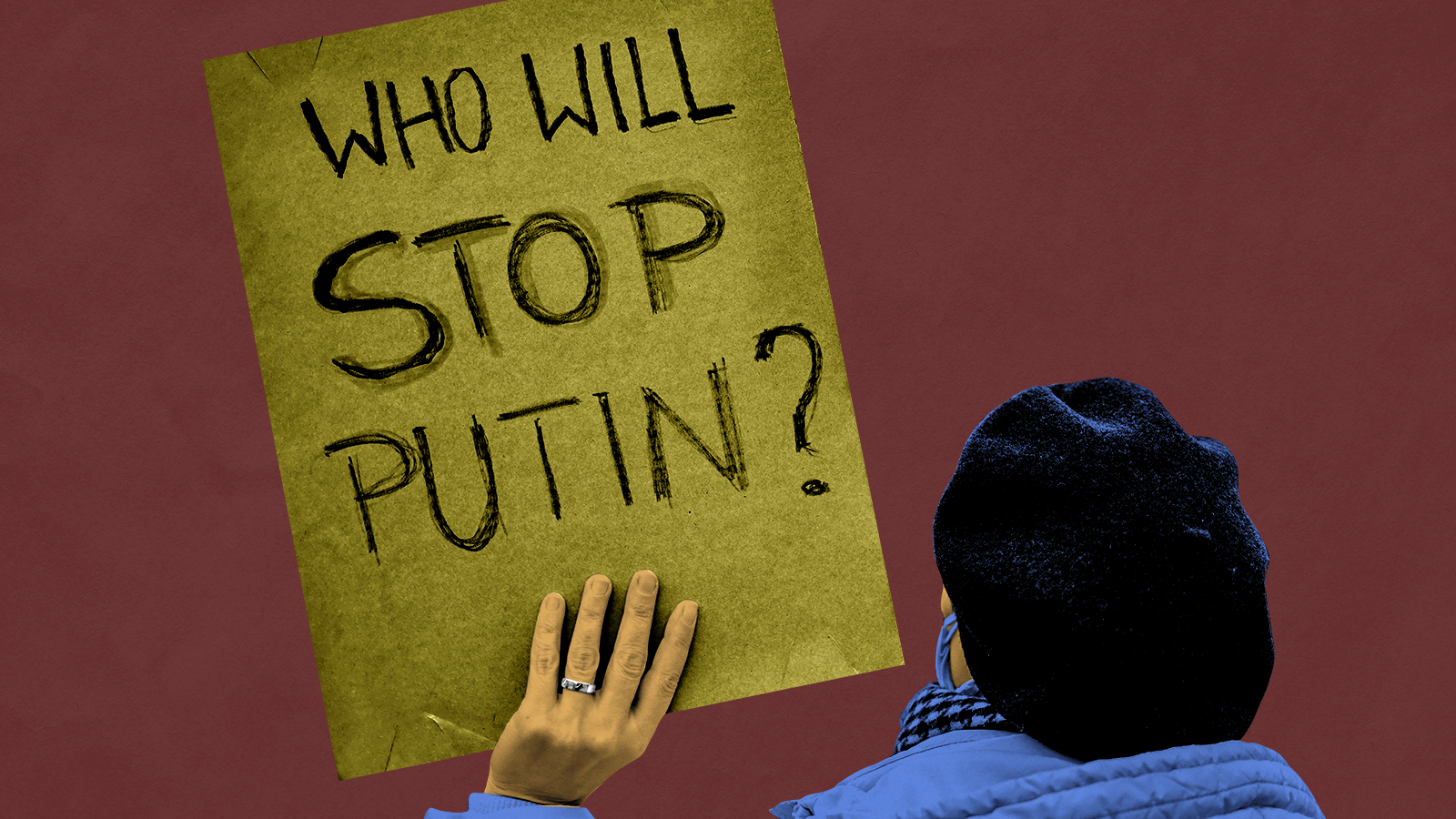When 'doing something' isn't an option


A free daily email with the biggest news stories of the day – and the best features from TheWeek.com
You are now subscribed
Your newsletter sign-up was successful
Sitting in my comfortable suburban Philadelphia home, watching horrific events unfold half a world away in Ukraine while protected by the most powerful military the world has ever known, I feel overwhelmed with sadness. Yes, of course, for the suffering and shattered aspirations of the Ukrainian people. But even more so for the sense that nothing significant can be done about it.
Sure, we've imposed some sanctions, and we're bound to impose some more. But does anyone really believe this will make a meaningful difference to Vladimir Putin's decision-making? Since Europeans are currently debating whether to grant Italy's request for a sanctions carve-out for luxury goods, forgive me for considering it unlikely.
Others propose to send weapons to Ukraine so they can wage an insurgency against what is bound to be either a Russian occupation or puppet regime installed in Kyiv. But I have questions. Like whether Putin will consider such an effort an act of war by NATO. (He certainly will.) And whether this would prompt him to attack military supply routes within a NATO country (most likely Poland), leading to a vastly broader war. (He just might.) And whether the European Union will have the stomach for setting in motion anything remotely like such a sequence of events. (They definitely won't.)
The Week
Escape your echo chamber. Get the facts behind the news, plus analysis from multiple perspectives.

Sign up for The Week's Free Newsletters
From our morning news briefing to a weekly Good News Newsletter, get the best of The Week delivered directly to your inbox.
From our morning news briefing to a weekly Good News Newsletter, get the best of The Week delivered directly to your inbox.
And anyway, should we even be encouraging a Ukrainian insurgency against Russia? Would it have any chance of success? Wouldn't it be more likely to provoke a truly brutal Russian response? I don't know about you, but I feel a little squeamish about advocating such a living hell for other people from the comfort of my American home office. As Thucydides put it millennia ago, "the strong do what they can, and the weak suffer what they must." Russia is strong and Ukraine is weak. Denying that reality isn't going to change it. It might actually increase the sum total of human misery.
And that leaves me feeling more than a little demoralized.
The fact of the matter is that what we are living through is the brutal end of the unipolar moment — that blink of an eye in the scheme of world history when the collapse of the Soviet Union left the United States as the world's most powerful nation bar none. Analysts have talked for years about the coming of a multipolar moment in which regional powers would challenge our primacy, and that moment has now arrived in Russia's near abroad. It will soon be extended in the South China Sea.
It will take a long time to gauge precisely what this geopolitical shift will mean for us and for the rest of the world. But we can already sense what it implies for those Americans who desperately, and understandably, long to fight the unfolding injustice in Ukraine. It implies a future of demoralized frustration as the world is forced to stand back and behold a searing demonstration of the limits of American power.
A free daily email with the biggest news stories of the day – and the best features from TheWeek.com
Damon Linker is a senior correspondent at TheWeek.com. He is also a former contributing editor at The New Republic and the author of The Theocons and The Religious Test.
-
 ‘Restaurateurs have become millionaires’
‘Restaurateurs have become millionaires’Instant Opinion Opinion, comment and editorials of the day
-
 Earth is rapidly approaching a ‘hothouse’ trajectory of warming
Earth is rapidly approaching a ‘hothouse’ trajectory of warmingThe explainer It may become impossible to fix
-
 Health insurance: Premiums soar as ACA subsidies end
Health insurance: Premiums soar as ACA subsidies endFeature 1.4 million people have dropped coverage
-
 What would a UK deployment to Ukraine look like?
What would a UK deployment to Ukraine look like?Today's Big Question Security agreement commits British and French forces in event of ceasefire
-
 Would Europe defend Greenland from US aggression?
Would Europe defend Greenland from US aggression?Today’s Big Question ‘Mildness’ of EU pushback against Trump provocation ‘illustrates the bind Europe finds itself in’
-
 Is conscription the answer to Europe’s security woes?
Is conscription the answer to Europe’s security woes?Today's Big Question How best to boost troop numbers to deal with Russian threat is ‘prompting fierce and soul-searching debates’
-
 Trump peace deal: an offer Zelenskyy can’t refuse?
Trump peace deal: an offer Zelenskyy can’t refuse?Today’s Big Question ‘Unpalatable’ US plan may strengthen embattled Ukrainian president at home
-
 The Baltic ‘bog belt’ plan to protect Europe from Russia
The Baltic ‘bog belt’ plan to protect Europe from RussiaUnder the Radar Reviving lost wetland on Nato’s eastern flank would fuse ‘two European priorities that increasingly compete for attention and funding: defence and climate’
-
 How should Nato respond to Putin’s incursions?
How should Nato respond to Putin’s incursions?Today’s big question Russia has breached Nato airspace regularly this month, and nations are primed to respond
-
 What will bring Vladimir Putin to the negotiating table?
What will bring Vladimir Putin to the negotiating table?Today’s Big Question With diplomatic efforts stalling, the US and EU turn again to sanctions as Russian drone strikes on Poland risk dramatically escalating conflict
-
 The mission to demine Ukraine
The mission to demine UkraineThe Explainer An estimated quarter of the nation – an area the size of England – is contaminated with landmines and unexploded shells from the war
